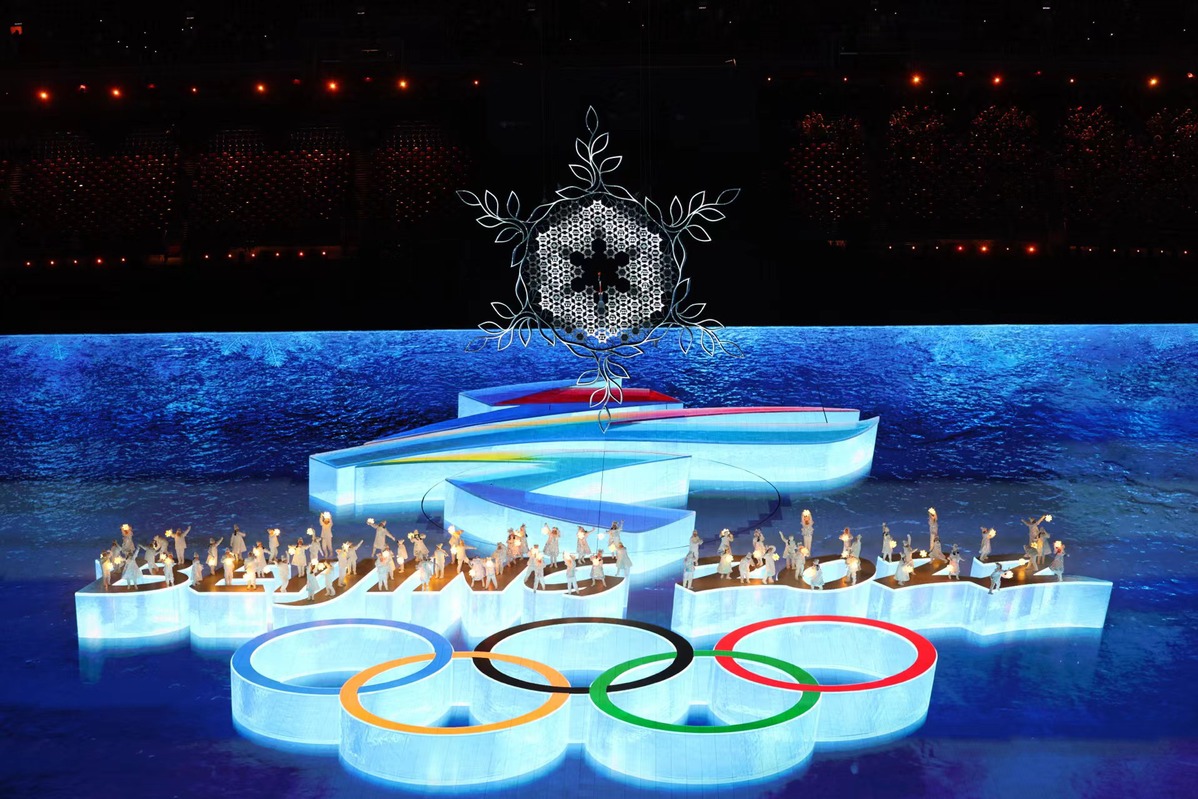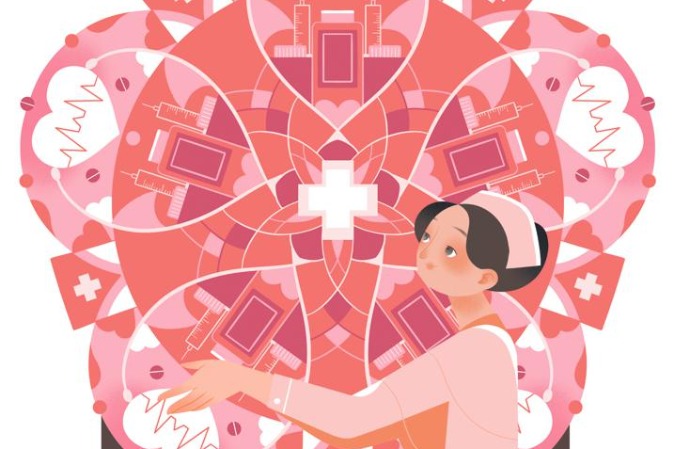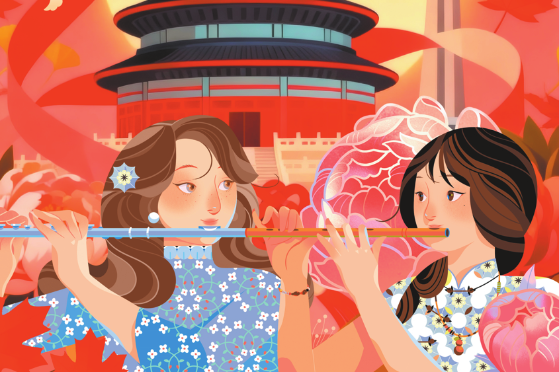Beijing Winter Olympics: Historic and precious legacy


The opening ceremony of the Beijing 2022 Winter Olympic Games was held on Feb 4, 2022, or lichun (Beginning of Spring), the first of the 24 solar terms on the Chinese lunar calendar, which indicates the awakening of everything and the ending of cold. Beijing became the world’s first city to host both the Summer and Winter Olympic Games and made this lichun more meaningful for the Chinese people. It also brought enthusiasm, strength and hope to the world facing so many adversities.
In 2008, when the world was mired in the financial crisis, China, working with international partners, held the 2008 Summer Olympic Games in Beijing, manifesting great solidarity. After that, the country and other major economies made joint efforts to coordinate macroeconomic policies to cope with the crisis. Fourteen years have passed, and the world is facing more severe challenges and more difficult choices. Thanks to the efforts of all, the Winter Olympics Beijing 2022 opened as scheduled, despite the pandemic; 2,892 athletes from 91 countries and regions, as well as coaches, technicians, medical workers and journalists participated in this grand event. With sports as the medium, this Winter Olympics proved the possibility and historic value of humankind’s bridging differences, enhancing solidarity and overcoming difficulties together.
The Beijing 2022 Winter Olympics was held at a historic moment. Currently, we are faced with more severe challenges than at the PyeongChang Winter Olympics. In 2018, whenever the women’s ice hockey team composed of athletes from the Democratic People’s Republic of Korea and Republic of Korea came on the scene, the audience would wave banners bearing, “We are One”. In 2022, while freestyle skiers were jumping into the air at Big Air Shougang in Beijing, the world was still suffering from the COVID-19 pandemic. So far, 400 million people have been infected, and 5.77 million people have lost their lives. It is difficult to close the global immunization gap, and there is a lack of international consensus on strategies for pandemic prevention and control. At the same time, populism prevails and economic globalization is challenged by headwinds. The climate change crisis is worsening, but finger-pointing is overriding our need to share responsibility. With an increasing number of regional hotspot issues, the prospects for peace seem bleak. “On COVID-19, global finance, climate action, lawlessness in cyberspace, and peace and security,” said UN Secretary-General Antonio Guterres, “we face a five-alarm global fire that requires the full mobilization of all countries.”
The Beijing 2022 Winter Olympics brought the world together regardless of differences. According to IOC, the Winter Olympics, thanks to digital technology, was the most-watched Winter Olympic Games ever. Audiences from five continents brought to reality “people far away from each other sharing the moment together” through TV sets, PCs and mobile phones. “In a moment when we see so many expressions of populism, so many expressions of racism, so many expressions of xenophobia, anti-Semitism, anti-Muslim hatred, to be here and to be with athletes that come from all cultures, from all countries, from all ethnicities, from all religions, it’s a fantastic message,” Guterres said. This is why we reached a consensus against taking the Olympics hostage with politics. Any form of boycott ultimately hurts the Olympic spirit, the Olympic movement and a gathering that marks the common spirit of humankind.
The Beijing 2022 Winter Olympics manifested the solidarity of humankind. As at the Tokyo Olympic Games, which closed eight months ago, we worked hard to show the solidarity and unyieldingness of humankind in the face of adversity with a successful Winter Olympics. In his address at the opening ceremony, Thomas Bach, president of the International Olympic Committee, said, “You the Olympic athletes – you will show how the world would look like, if we all respect the same rules and each other. This is the mission of the Olympic Games: bringing us together in peaceful competition.” In the Winter Olympics, sport is the only language. In the final of the Women’s Freestyle Skiing Aerials, Ashley Caldwell from the United States messed up the landing on her last jump, finishing fourth, but she excitedly hugged Xu Mengtao from China, who won her first gold medal in her fourth Olympics, and said, “Taotao, Olympic champion! I'm so proud of you!” In the round robin of the Curling Mixed Doubles, Chinese athletes presented Bing Dwen Dwen commemorative pins to their American opponents, who had just defeated them, and received warm thanks in return. After winning the gold medal in the Men’s Snowboard Big Air, Su Yiming from China took the initiative to embrace Mons Roisland from Norway, the runner-up, and Max Parrot from Canada, the bronze medalist, to express his admiration and thanks for having inspired him to go on. George Orwell said, “Sport is war minus the shooting,” but when seeing athletes wearing national flags hug and sincerely congratulate each other on the podium of Beijing 2022, we believe that besides “faster, higher and stronger”, “together” is truly the reflection of the Olympic spirit, which should also be practiced in coping with the pandemic, economic recovery, climate change, regional hotspot issues and other problems.
The Beijing 2022 Winter Olympics represented human civilization. Abdulla Shahid, president of the 76th session of the United Nations General Assembly, who attended the opening ceremony of Beijing 2022, said, “The Olympics represents humanity at its best. The best of the world coming together to compete graciously, to accept winning with humility and defeat with graciousness.” From the 8th century BC to the 4th century AD, the most extraordinary athletes from the Greek city-states gathered at Olympia to compete in contests of strength and beauty, and this led to the birth of the Olympic Truce. The Olympic Games stand for peace and honor, and for the sportsmanship of transcendence, teamwork, fair play, and respect for both the rules and the opponents - the very best qualities of human civilization that will pave the way for continuing our journey toward a shared future.
The Beijing 2022 Winter Olympics expressed the Chinese people’s sincere wish to promote world peace and development and to build a community with a shared future for humankind. President Xi Jinping said, “We shall keep in mind the original aspiration of the Olympic Movement and jointly uphold world peace. The Olympic Movement was born for the sake of peace and has thrived thanks to peace. The Olympic Truce Resolution adopted last December by consensus at the United Nations General Assembly, calling for promoting peace through sport, represents the common aspiration of the international community. We need to uphold mutual respect, equality, dialogue and consultation, strive to bridge differences and eliminate conflict, and work together for a world of durable peace.” In the midst of the COVID-19 pandemic, the Chinese government and the Chinese Olympic Committee donated masks to sports organizations and localities in Italy, Spain, Iran, the United States, France and Japan, demonstrating the solidarity and mutual support of the international Olympic family. Zhang Yimou, who directed the opening ceremonies of the Beijing Summer and Winter Olympic Games, said that while the opening ceremony of the 2008 Beijing Olympics was more about presenting China to the world, in 2022 it was more about the common feelings of human beings, shifting from “me” to “us”. The changes in the two opening ceremonies demonstrate the changes in the world view of the Chinese people over the past 14 years. To stage this feat of humankind and to endeavor to bridge the gap between countries and ethnicities through sports, the common language, the staff of the Beijing Winter Olympics Organizing Committee and all the volunteers gave up their Spring Festival holidays, and 22 million Beijingers and more than 4.1 million Zhangjiakou residents, as well as all the Chinese people, made their own contributions. Many athletes such as Aaron Blunck and Tessa Maud from the United States have spoken highly of the organization of the Beijing 2022 Winter Olympics, and in particular of the friendly and enthusiastic volunteers. Bach announced at the 139th IOC session that the Olympic Cup had been awarded to the Chinese people in recognition of their support for the Game. He said, “We could feel the warmth, the energy, the hospitality, and the support. Chinese people from all walks of life, across all generations, all welcomed the athletes and us very, very warmly.” The long-lasting Olympic spirit and the solidarity of the people of the world should become a stronger voice of the times as we move into the future.
People say that the once-in-a-century pandemic and geopolitical conflict are big tests, but this is not the first time that humanity has faced this kind of test, be it a natural catastrophe like a pandemic or a man-made disaster like a world war. All tests examine humanity’s capability of overcoming its own weaknesses and its potential in moving together toward a brighter future. Our generation, when reading about the history of wars and suffering, would question our ancestors on why they hadn’t joined hands to stop the human suffering. But today, when confronted with COVID-19, geopolitical conflict, climate change and other common challenges, we should ask ourselves, “Shall we put aside our preconceptions and selfish calculations and work for the shared future of humanity, or shall we dwell on the gains and losses of the moment and stand by, and even reap the benefits while others are working hard?” I believe our descendants will also comment on the choices we make today.
The author is the vice president and research fellow of the Development Research Center of the State Council of the People’s Republic of China.
The opinions expressed here are those of the writer and do not necessarily represent the views of China Daily and China Daily website.
If you have specific expertise or would like to share your thoughts, then send your writings to opinion@chinadaily.com.cn and comment@chinadaily.com.cn.


































